Exploring Barriers: Lack of Participation in Bowel Cancer Screening
VerifiedAdded on 2023/06/13
|7
|1242
|102
Essay
AI Summary
This essay explores the critical issue of low participation rates in bowel cancer screening programs in Australia, despite bowel cancer being a significant cause of cancer-related deaths. It delves into various influencing factors, including social, cultural, economic, historical, and political aspects, that contribute to this lack of participation. The analysis reveals that a lack of awareness, cultural sensitivities, language barriers, historical mistrust of government initiatives among minority groups, and economic concerns all play significant roles in deterring individuals from participating in the free bowel cancer screening programs. The essay concludes by emphasizing the urgent need to address these multifaceted barriers to improve early detection rates and ultimately reduce bowel cancer mortality in Australia. Desklib offers a range of resources, including similar essays and solved assignments, to support students in their studies.
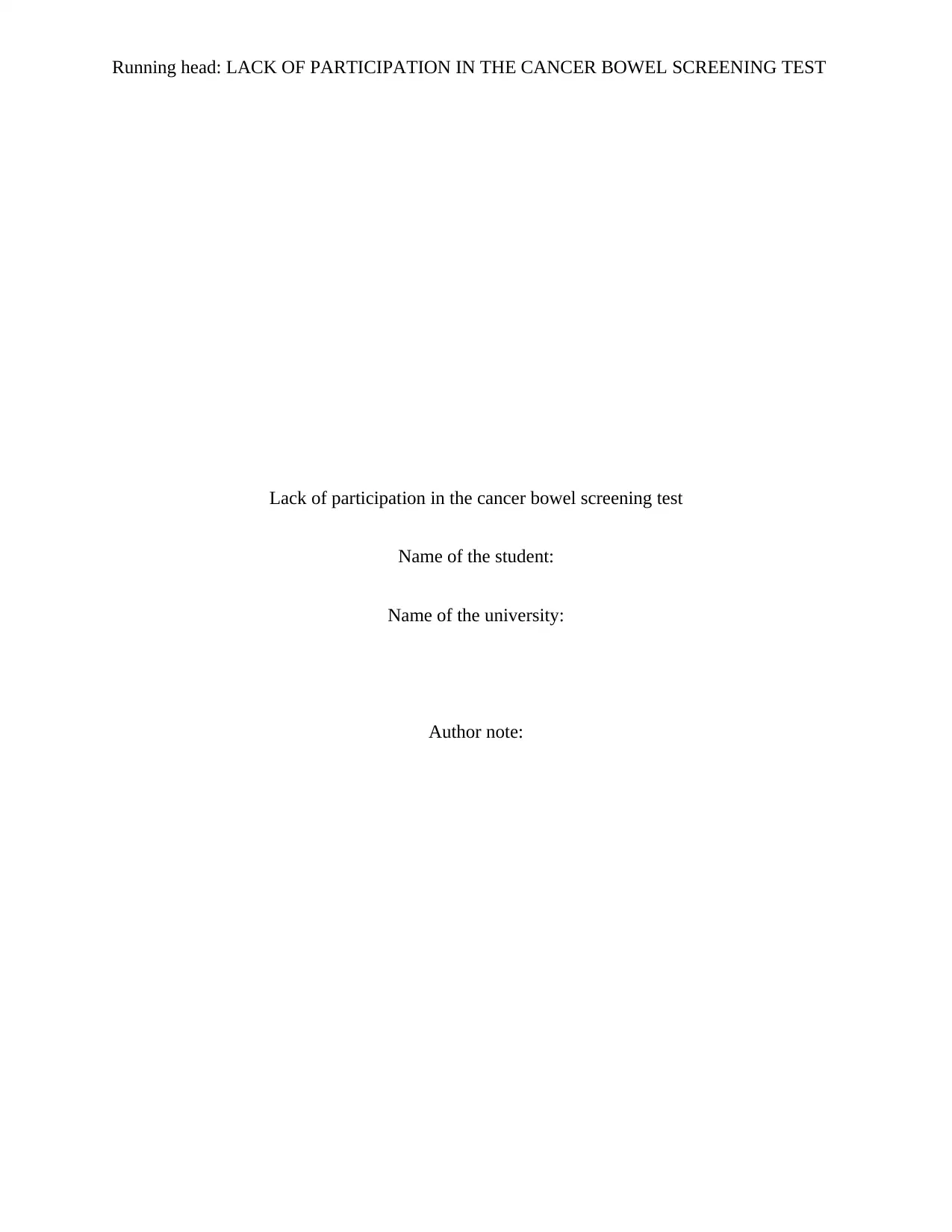
Running head: LACK OF PARTICIPATION IN THE CANCER BOWEL SCREENING TEST
Lack of participation in the cancer bowel screening test
Name of the student:
Name of the university:
Author note:
Lack of participation in the cancer bowel screening test
Name of the student:
Name of the university:
Author note:
Paraphrase This Document
Need a fresh take? Get an instant paraphrase of this document with our AI Paraphraser
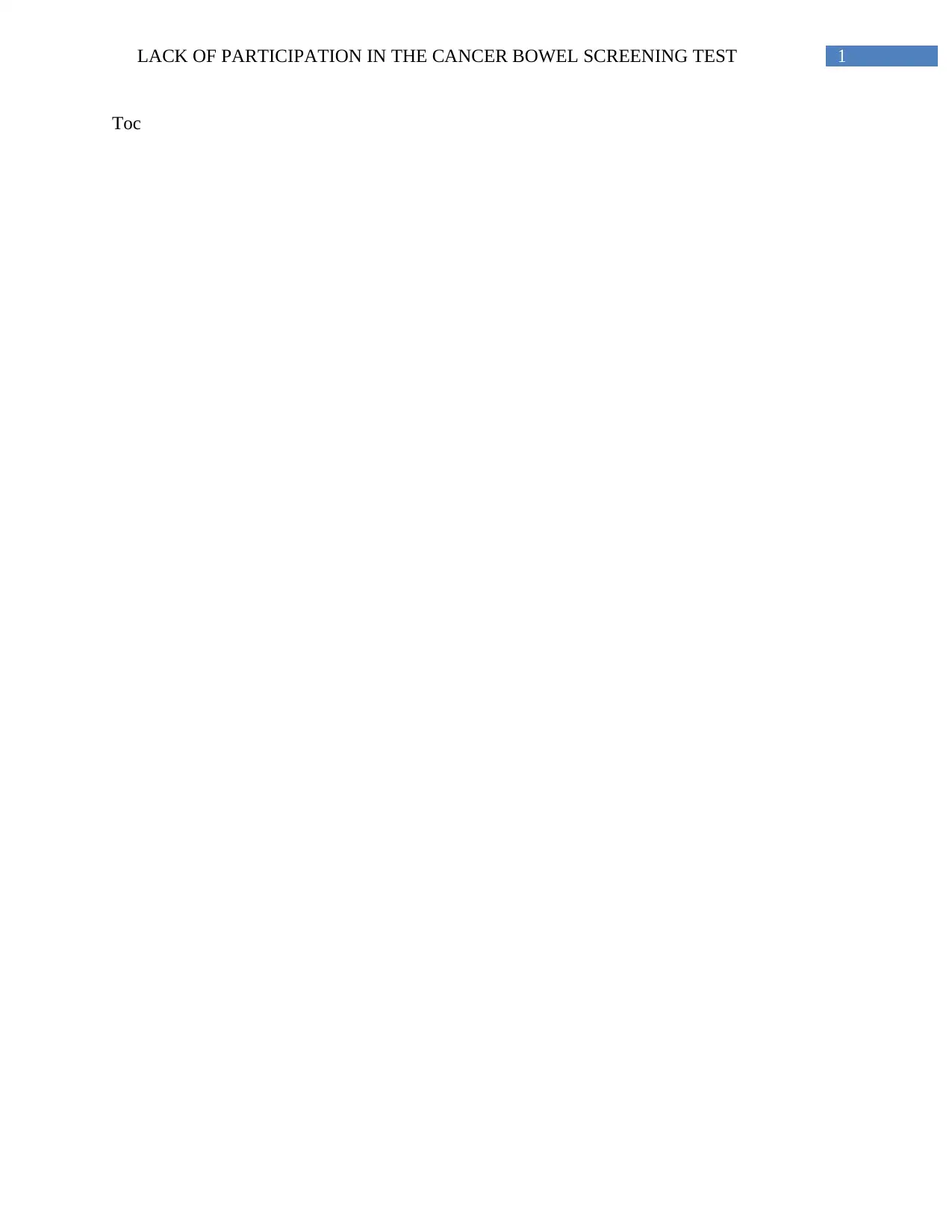
1LACK OF PARTICIPATION IN THE CANCER BOWEL SCREENING TEST
Toc
Toc
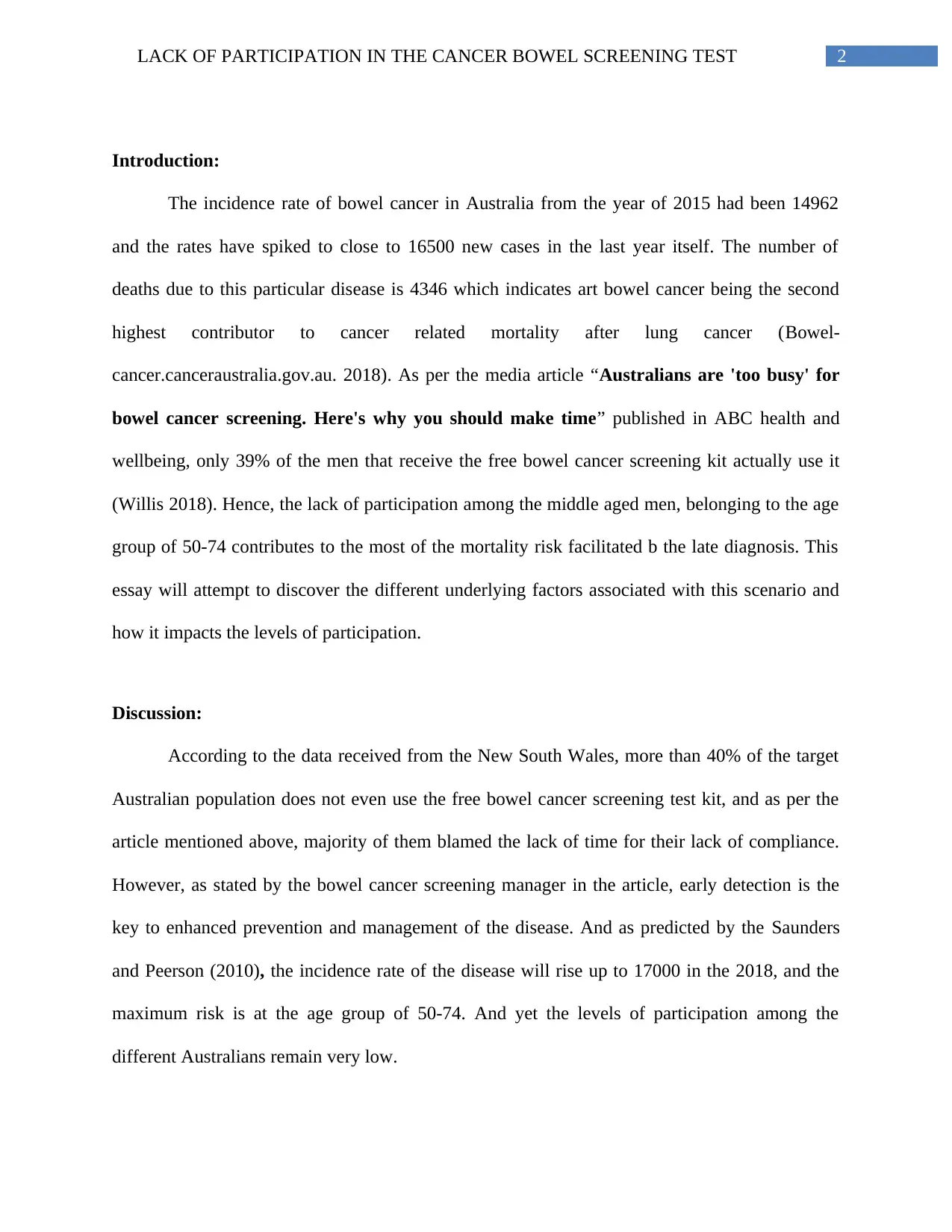
2LACK OF PARTICIPATION IN THE CANCER BOWEL SCREENING TEST
Introduction:
The incidence rate of bowel cancer in Australia from the year of 2015 had been 14962
and the rates have spiked to close to 16500 new cases in the last year itself. The number of
deaths due to this particular disease is 4346 which indicates art bowel cancer being the second
highest contributor to cancer related mortality after lung cancer (Bowel-
cancer.canceraustralia.gov.au. 2018). As per the media article “Australians are 'too busy' for
bowel cancer screening. Here's why you should make time” published in ABC health and
wellbeing, only 39% of the men that receive the free bowel cancer screening kit actually use it
(Willis 2018). Hence, the lack of participation among the middle aged men, belonging to the age
group of 50-74 contributes to the most of the mortality risk facilitated b the late diagnosis. This
essay will attempt to discover the different underlying factors associated with this scenario and
how it impacts the levels of participation.
Discussion:
According to the data received from the New South Wales, more than 40% of the target
Australian population does not even use the free bowel cancer screening test kit, and as per the
article mentioned above, majority of them blamed the lack of time for their lack of compliance.
However, as stated by the bowel cancer screening manager in the article, early detection is the
key to enhanced prevention and management of the disease. And as predicted by the Saunders
and Peerson (2010), the incidence rate of the disease will rise up to 17000 in the 2018, and the
maximum risk is at the age group of 50-74. And yet the levels of participation among the
different Australians remain very low.
Introduction:
The incidence rate of bowel cancer in Australia from the year of 2015 had been 14962
and the rates have spiked to close to 16500 new cases in the last year itself. The number of
deaths due to this particular disease is 4346 which indicates art bowel cancer being the second
highest contributor to cancer related mortality after lung cancer (Bowel-
cancer.canceraustralia.gov.au. 2018). As per the media article “Australians are 'too busy' for
bowel cancer screening. Here's why you should make time” published in ABC health and
wellbeing, only 39% of the men that receive the free bowel cancer screening kit actually use it
(Willis 2018). Hence, the lack of participation among the middle aged men, belonging to the age
group of 50-74 contributes to the most of the mortality risk facilitated b the late diagnosis. This
essay will attempt to discover the different underlying factors associated with this scenario and
how it impacts the levels of participation.
Discussion:
According to the data received from the New South Wales, more than 40% of the target
Australian population does not even use the free bowel cancer screening test kit, and as per the
article mentioned above, majority of them blamed the lack of time for their lack of compliance.
However, as stated by the bowel cancer screening manager in the article, early detection is the
key to enhanced prevention and management of the disease. And as predicted by the Saunders
and Peerson (2010), the incidence rate of the disease will rise up to 17000 in the 2018, and the
maximum risk is at the age group of 50-74. And yet the levels of participation among the
different Australians remain very low.
⊘ This is a preview!⊘
Do you want full access?
Subscribe today to unlock all pages.

Trusted by 1+ million students worldwide
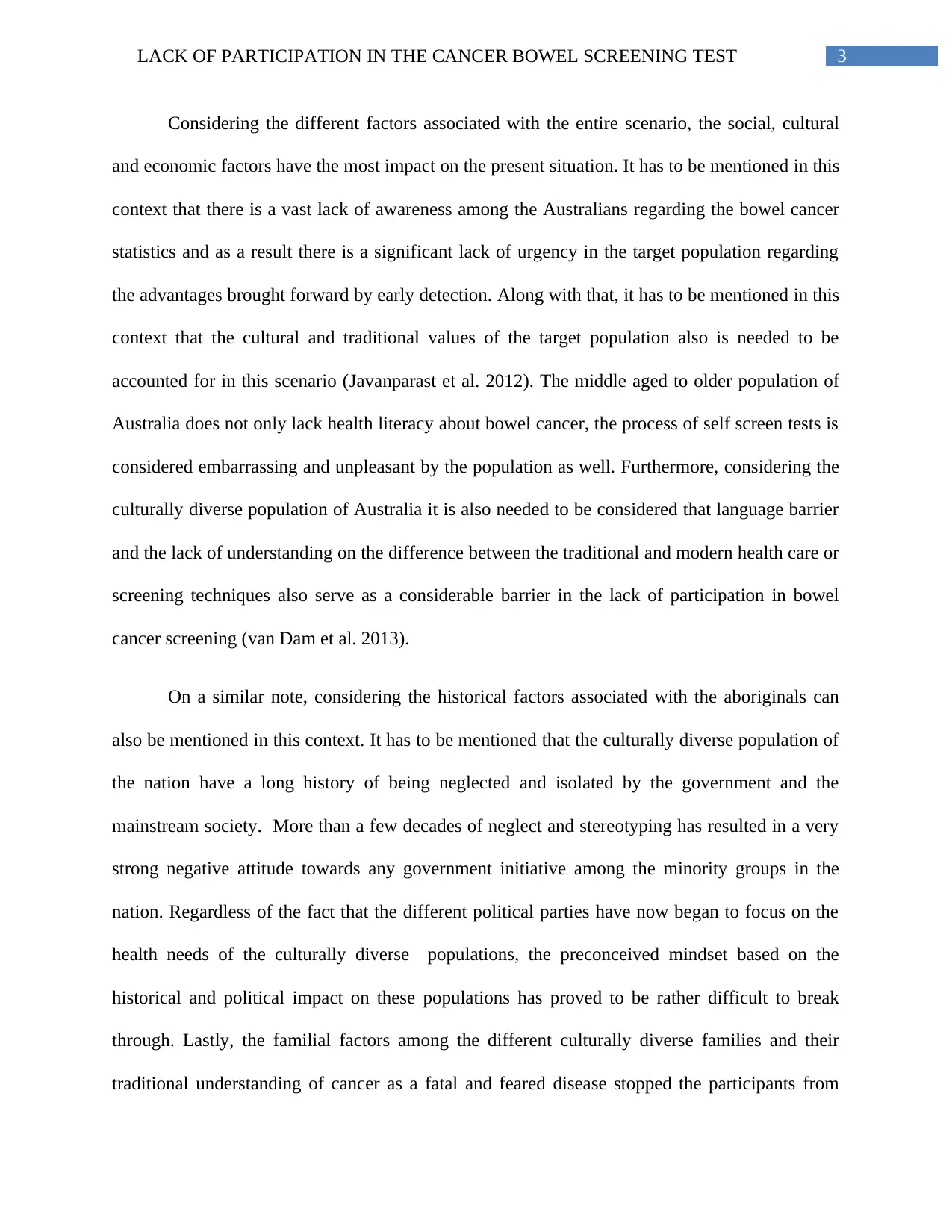
3LACK OF PARTICIPATION IN THE CANCER BOWEL SCREENING TEST
Considering the different factors associated with the entire scenario, the social, cultural
and economic factors have the most impact on the present situation. It has to be mentioned in this
context that there is a vast lack of awareness among the Australians regarding the bowel cancer
statistics and as a result there is a significant lack of urgency in the target population regarding
the advantages brought forward by early detection. Along with that, it has to be mentioned in this
context that the cultural and traditional values of the target population also is needed to be
accounted for in this scenario (Javanparast et al. 2012). The middle aged to older population of
Australia does not only lack health literacy about bowel cancer, the process of self screen tests is
considered embarrassing and unpleasant by the population as well. Furthermore, considering the
culturally diverse population of Australia it is also needed to be considered that language barrier
and the lack of understanding on the difference between the traditional and modern health care or
screening techniques also serve as a considerable barrier in the lack of participation in bowel
cancer screening (van Dam et al. 2013).
On a similar note, considering the historical factors associated with the aboriginals can
also be mentioned in this context. It has to be mentioned that the culturally diverse population of
the nation have a long history of being neglected and isolated by the government and the
mainstream society. More than a few decades of neglect and stereotyping has resulted in a very
strong negative attitude towards any government initiative among the minority groups in the
nation. Regardless of the fact that the different political parties have now began to focus on the
health needs of the culturally diverse populations, the preconceived mindset based on the
historical and political impact on these populations has proved to be rather difficult to break
through. Lastly, the familial factors among the different culturally diverse families and their
traditional understanding of cancer as a fatal and feared disease stopped the participants from
Considering the different factors associated with the entire scenario, the social, cultural
and economic factors have the most impact on the present situation. It has to be mentioned in this
context that there is a vast lack of awareness among the Australians regarding the bowel cancer
statistics and as a result there is a significant lack of urgency in the target population regarding
the advantages brought forward by early detection. Along with that, it has to be mentioned in this
context that the cultural and traditional values of the target population also is needed to be
accounted for in this scenario (Javanparast et al. 2012). The middle aged to older population of
Australia does not only lack health literacy about bowel cancer, the process of self screen tests is
considered embarrassing and unpleasant by the population as well. Furthermore, considering the
culturally diverse population of Australia it is also needed to be considered that language barrier
and the lack of understanding on the difference between the traditional and modern health care or
screening techniques also serve as a considerable barrier in the lack of participation in bowel
cancer screening (van Dam et al. 2013).
On a similar note, considering the historical factors associated with the aboriginals can
also be mentioned in this context. It has to be mentioned that the culturally diverse population of
the nation have a long history of being neglected and isolated by the government and the
mainstream society. More than a few decades of neglect and stereotyping has resulted in a very
strong negative attitude towards any government initiative among the minority groups in the
nation. Regardless of the fact that the different political parties have now began to focus on the
health needs of the culturally diverse populations, the preconceived mindset based on the
historical and political impact on these populations has proved to be rather difficult to break
through. Lastly, the familial factors among the different culturally diverse families and their
traditional understanding of cancer as a fatal and feared disease stopped the participants from
Paraphrase This Document
Need a fresh take? Get an instant paraphrase of this document with our AI Paraphraser
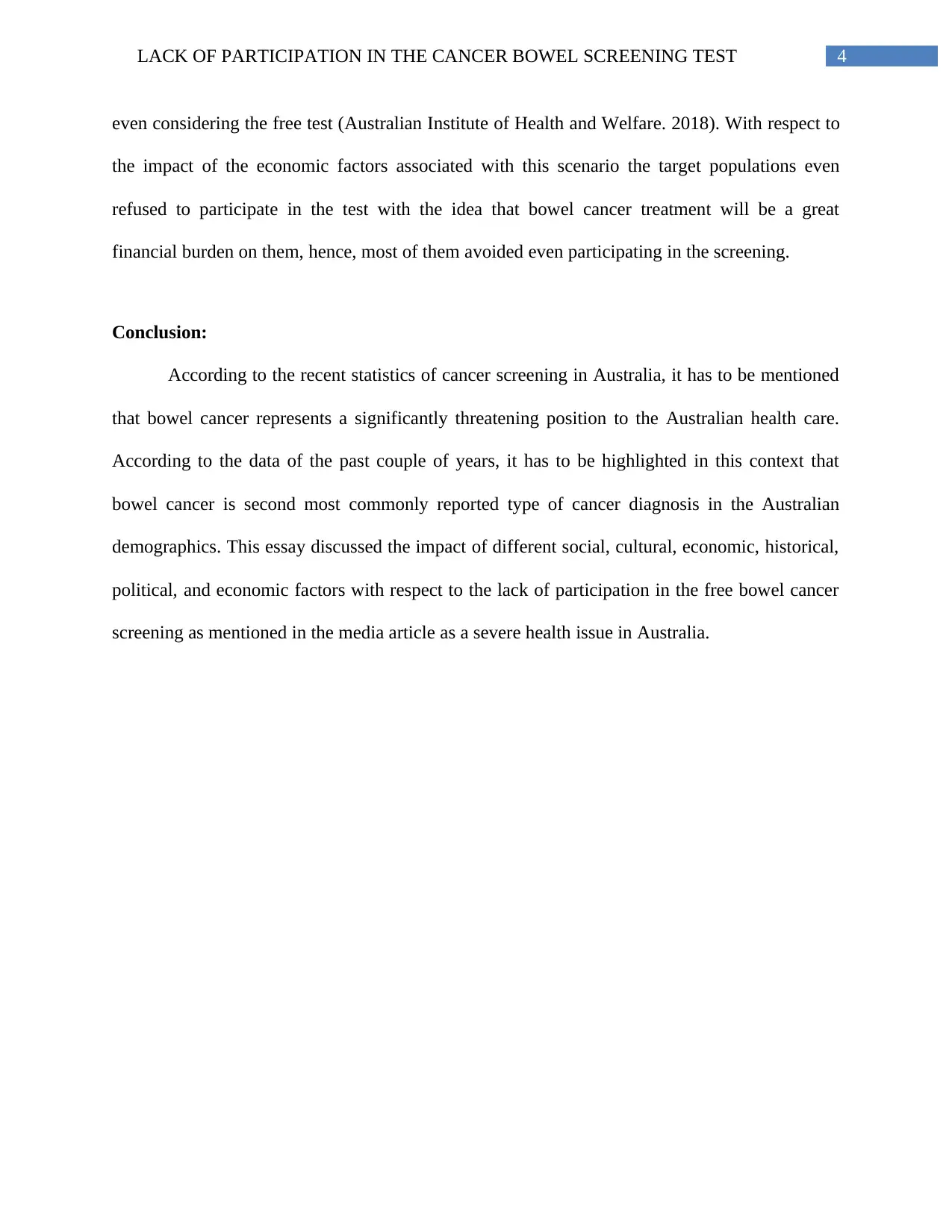
4LACK OF PARTICIPATION IN THE CANCER BOWEL SCREENING TEST
even considering the free test (Australian Institute of Health and Welfare. 2018). With respect to
the impact of the economic factors associated with this scenario the target populations even
refused to participate in the test with the idea that bowel cancer treatment will be a great
financial burden on them, hence, most of them avoided even participating in the screening.
Conclusion:
According to the recent statistics of cancer screening in Australia, it has to be mentioned
that bowel cancer represents a significantly threatening position to the Australian health care.
According to the data of the past couple of years, it has to be highlighted in this context that
bowel cancer is second most commonly reported type of cancer diagnosis in the Australian
demographics. This essay discussed the impact of different social, cultural, economic, historical,
political, and economic factors with respect to the lack of participation in the free bowel cancer
screening as mentioned in the media article as a severe health issue in Australia.
even considering the free test (Australian Institute of Health and Welfare. 2018). With respect to
the impact of the economic factors associated with this scenario the target populations even
refused to participate in the test with the idea that bowel cancer treatment will be a great
financial burden on them, hence, most of them avoided even participating in the screening.
Conclusion:
According to the recent statistics of cancer screening in Australia, it has to be mentioned
that bowel cancer represents a significantly threatening position to the Australian health care.
According to the data of the past couple of years, it has to be highlighted in this context that
bowel cancer is second most commonly reported type of cancer diagnosis in the Australian
demographics. This essay discussed the impact of different social, cultural, economic, historical,
political, and economic factors with respect to the lack of participation in the free bowel cancer
screening as mentioned in the media article as a severe health issue in Australia.
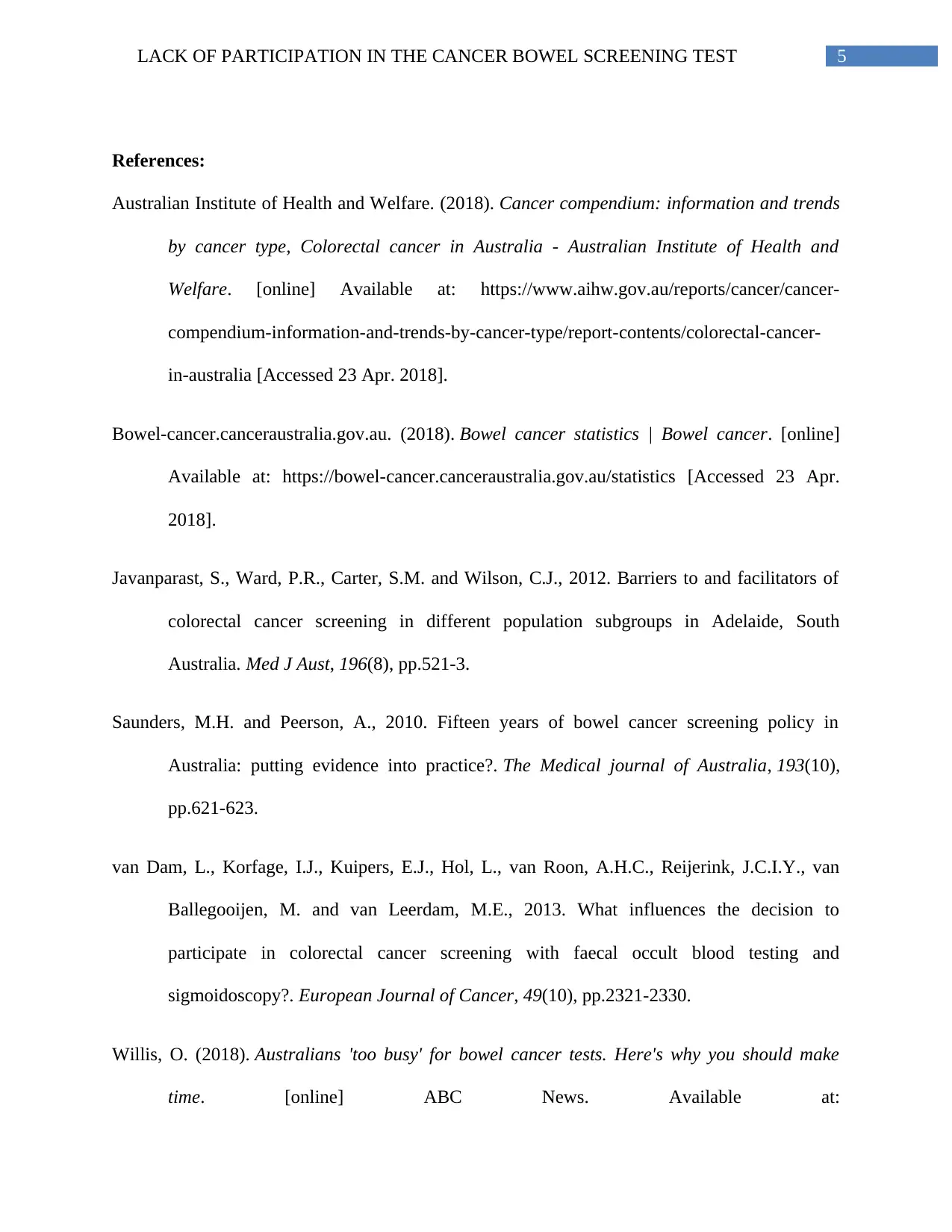
5LACK OF PARTICIPATION IN THE CANCER BOWEL SCREENING TEST
References:
Australian Institute of Health and Welfare. (2018). Cancer compendium: information and trends
by cancer type, Colorectal cancer in Australia - Australian Institute of Health and
Welfare. [online] Available at: https://www.aihw.gov.au/reports/cancer/cancer-
compendium-information-and-trends-by-cancer-type/report-contents/colorectal-cancer-
in-australia [Accessed 23 Apr. 2018].
Bowel-cancer.canceraustralia.gov.au. (2018). Bowel cancer statistics | Bowel cancer. [online]
Available at: https://bowel-cancer.canceraustralia.gov.au/statistics [Accessed 23 Apr.
2018].
Javanparast, S., Ward, P.R., Carter, S.M. and Wilson, C.J., 2012. Barriers to and facilitators of
colorectal cancer screening in different population subgroups in Adelaide, South
Australia. Med J Aust, 196(8), pp.521-3.
Saunders, M.H. and Peerson, A., 2010. Fifteen years of bowel cancer screening policy in
Australia: putting evidence into practice?. The Medical journal of Australia, 193(10),
pp.621-623.
van Dam, L., Korfage, I.J., Kuipers, E.J., Hol, L., van Roon, A.H.C., Reijerink, J.C.I.Y., van
Ballegooijen, M. and van Leerdam, M.E., 2013. What influences the decision to
participate in colorectal cancer screening with faecal occult blood testing and
sigmoidoscopy?. European Journal of Cancer, 49(10), pp.2321-2330.
Willis, O. (2018). Australians 'too busy' for bowel cancer tests. Here's why you should make
time. [online] ABC News. Available at:
References:
Australian Institute of Health and Welfare. (2018). Cancer compendium: information and trends
by cancer type, Colorectal cancer in Australia - Australian Institute of Health and
Welfare. [online] Available at: https://www.aihw.gov.au/reports/cancer/cancer-
compendium-information-and-trends-by-cancer-type/report-contents/colorectal-cancer-
in-australia [Accessed 23 Apr. 2018].
Bowel-cancer.canceraustralia.gov.au. (2018). Bowel cancer statistics | Bowel cancer. [online]
Available at: https://bowel-cancer.canceraustralia.gov.au/statistics [Accessed 23 Apr.
2018].
Javanparast, S., Ward, P.R., Carter, S.M. and Wilson, C.J., 2012. Barriers to and facilitators of
colorectal cancer screening in different population subgroups in Adelaide, South
Australia. Med J Aust, 196(8), pp.521-3.
Saunders, M.H. and Peerson, A., 2010. Fifteen years of bowel cancer screening policy in
Australia: putting evidence into practice?. The Medical journal of Australia, 193(10),
pp.621-623.
van Dam, L., Korfage, I.J., Kuipers, E.J., Hol, L., van Roon, A.H.C., Reijerink, J.C.I.Y., van
Ballegooijen, M. and van Leerdam, M.E., 2013. What influences the decision to
participate in colorectal cancer screening with faecal occult blood testing and
sigmoidoscopy?. European Journal of Cancer, 49(10), pp.2321-2330.
Willis, O. (2018). Australians 'too busy' for bowel cancer tests. Here's why you should make
time. [online] ABC News. Available at:
⊘ This is a preview!⊘
Do you want full access?
Subscribe today to unlock all pages.

Trusted by 1+ million students worldwide
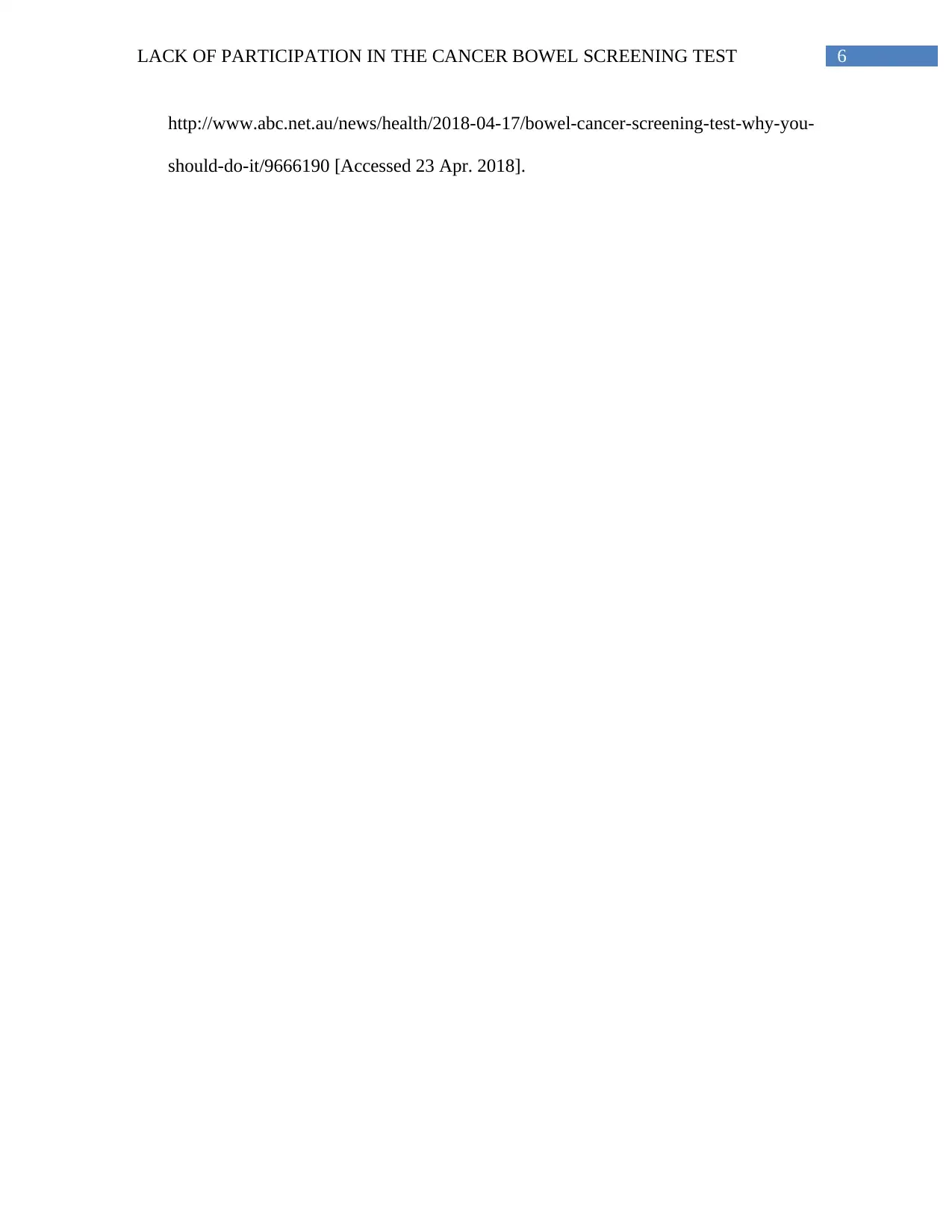
6LACK OF PARTICIPATION IN THE CANCER BOWEL SCREENING TEST
http://www.abc.net.au/news/health/2018-04-17/bowel-cancer-screening-test-why-you-
should-do-it/9666190 [Accessed 23 Apr. 2018].
http://www.abc.net.au/news/health/2018-04-17/bowel-cancer-screening-test-why-you-
should-do-it/9666190 [Accessed 23 Apr. 2018].
1 out of 7
Related Documents
Your All-in-One AI-Powered Toolkit for Academic Success.
+13062052269
info@desklib.com
Available 24*7 on WhatsApp / Email
![[object Object]](/_next/static/media/star-bottom.7253800d.svg)
Unlock your academic potential
Copyright © 2020–2026 A2Z Services. All Rights Reserved. Developed and managed by ZUCOL.





